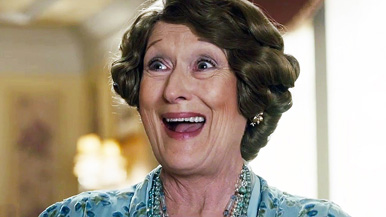Movie Review: Florence Foster Jenkins
By Ben Gruchow
August 23, 2016
One looks at Florence Foster Jenkins with persistent curiosity: what do you suppose was actually going through her mind in the moments when she would give an earnest performance that would have her audience visibly agape at the spectacle unfolding in front of them? Jenkins was legendary for her singing talent, or lack thereof, to the point where her peers were reduced to dancing around actual quality when asked for their assessment; as her seasoned vocal coach puts it in the opening act of the new movie about the lady, “the word is authenticity.”
Authenticity, I suppose, is right. You can’t really accuse Jenkins of pretending to be someone or something she’s not; in her mind, she was exactly the sort of vocalist she wanted to be. And despite the technical shortcomings of her instrument, which were manifold, she conveys her lifelong love for the concept and theory of music in general and opera specifically - if not anything resembling a comprehension of how those concepts and theories work - in the recordings of her that survive.
Anyone going into Stephen Frears’ Florence Foster Jenkins looking for an illustrative or entertaining trainwreck will be disappointed. The incarnation of Jenkins here may indeed convey non-functional singing capability by Meryl Streep, but I’d say it shortchanges the real woman’s personality. Rather than a woman in possession of her own convictions about her vocal ability, Streep’s Jenkins plays disingenuous; she is unaware until the very end that her audience has been laughing at her and not with her. This has the effect of sanding the woman down, and I would have liked to see a Jenkins portrayed with her defiance and persistence more intact.
Streep plays Jenkins mostly as a woman with a suspicion of awareness; she knows that she has an abiding passion for music and opera, originating from childhood and persisting past the trials of her young adulthood. She makes the decision to pursue singing after being moved to tears by a young woman’s vocal one evening, recruits a vocal coach and a pianist, and exerts her considerable influence in the arts community of New York City to realize that decision. She seems to know that something is not quite right with her progress, but is more than willing to be assured by Cosme McMoon (Simon Helberg) and especially her husband St Clair Bayfield (Hugh Grant) that she is performing wonderfully.
This sets us up for two performance sequences in the film that build with the apprehension and dread more expected of a suspense thriller. There is the feeling as we ramp up for Jenkins’ first stage performance in years that we are about to witness a humiliation along the lines of Carrie at the prom, and this feeling is much amplified for the second sequence, set at Jenkins’ infamous Carnegie Hall performance. And it’s really a sign of how skillfully Frears, Streep, Grant, and Helberg have sold us on this incarnation of these people; one character ventures to another late in the film that he has grown to love Jenkins and consider her a friend, and we realize we do care about these people, and that they achieve the limited degree of success that they are aiming for.
Continued:
1
2




